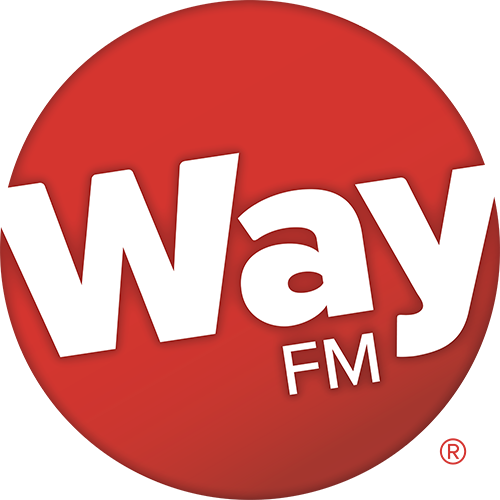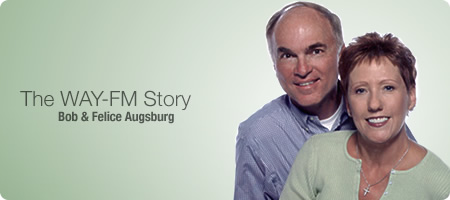Who are we?
Our Mission
Using media in a culturally relevant way to influence this generation to love and follow Jesus.
Our Core Values
Founded in 1987 as an outreach to youth and young adults, we remain committed to that cause. Our Core Values are our commitment to unchanging beliefs and represent how we live while working toward our mission.
Scriptural Alignment
“We look to God’s Word to guide us in all areas of our personal and professional lives.”
Psalm 119:105
Prayer
“We believe prayer is essential to the wisdom we need and the decisions we make”.
James 1:5
Integrity
“We strive to live with integrity, honesty and transparency in our public and private lives”.
Proverbs 20:7
Excellence
“We are passionate about excellence and welcome vigorous discussion and exchange of ideas united around the common goal of impacting more lives”.
Colossians 3:23
Community Impact
“We mobilize believers and partner with churches and ministries to demonstrate Jesus’ love in tangible ways to make a difference in the communities we serve”.
1 John 3:18
Research Driven
“We are committed to ongoing audience research, believing that it’s not about us and our preferences, but about reaching as many people as possible”.
Philippians 2:4
Servanthood
“We are committed to working together with humility, mutual respect flexibility and cooperation”.
Ephesians 4:2-3
Behind the Ministry of WayFM
1987-2007 // Bob and Felice Augsburg
by Amy Bartlett
In the early 1980’s Christian music radio networks as they exist today were yet to be created. Contemporary Christian music itself was barely a trickle compared to its cultural presence in 2007. But the 1980’s would prove to be a pioneering decade for the Christian pop and rock airwaves. One of those waves started on the shores of Southwest Florida and in the twenty years that followed, crossed the country and changed the way Christian radio was done.
1982.
Bob and his wife Felice had moved back to Fort Myers, Florida mainly to raise their children near family. Bob took on the position of Program Director at WSOR in Fort Myers. WSOR catered mostly to the senior citizen community which was the majority of the population. On-air, Bob handled the morning show, targeted at a 45+ audience but he sensed something was missing. Something was missing, but not just at that station — it was missing culturally, nationwide. So Bob approached his superiors with the idea of committing at least a segment of air time to the area’s college and high school community. There was concern about confusing or losing a handful of their target listeners, but still there was clearly a need that wasn’t being met and the station stepped up to bat. At the time, Bob recounts, “there was perhaps one album coming out every six months,” which would make programming a weekly segment hard enough. New music to program a station’s daily playlist was out of the question.
Bob’s proposal was approved. They called the program “Lifeline.” It was to be a 5 hour stretch of Christian pop and rock on Saturday nights hosted by Jeff Taylor and its impact was immediately detectable. A group of local youth pastors, inspired by the “buzz” they were hearing from youth and their families started putting on local concerts. Bob and Felice attended one of these events and watched as 150 or so teenagers went forward to accept Christ. It was a powerful image of the impact this one small programming step was making on real lives, but it stirred deeper questions.
“Why Can’t We Start A Station Of Our Own?”
What is going to minister to these kids now?” Bob and Felice asked themselves leaving that evening. There were now over a hundred more teens with a new and questioning faith in the immediately surrounding area but with no Christian music alternative to turn to on the air until Saturday night. Crossing the Caloosahatchee Bridge that night Felice dropped the nine words that would, not immediately, but gradually change their lives and millions of others’. “I was so touched by what went on at that concert,” she recalls, “that I turned to Bob and said, ’Why can’t we start a station of our own?’”
In his own words, Bob admits his first reaction was, “That’s impossible.” “Big man of faith,” Bob jokes now, sitting on what had grown into global impact. “I was making around $13,000 a year with two kids attending Christian schools — already having no idea how that was possible — and aside from financial impossibilities, we knew nothing about how to start or sustain a radio station. I put a blanket on the idea right away.” Felice had planted a seed, though, that would refuse to lay dormant. “I didn’t give it too much thought after that night,” Bob admits. “But every so often it would come up again. Something would stir the notion.”
WSOR was being serviced with new contemporary releases that weren’t usable for their older demographic, and Bob would take them home, prompting Felice to start on the seed again: “Why can’t the station play this music? It ministers to me.” She could see that her husband was feeling God’s nudge to “go and do,” but that he was stuck on the “what and how.” She recalls telling him, “Bob, the young people in this area so badly need a station like this and you’re not going to be fulfilled or happy until you step out and see if God will open the door. If you’re not knocking on the door, then how do you know that God can’t come through for us? You say you believe that He can do anything and yet your refuse to pursue the idea.”
“…aside from financial impossibilities, we knew nothing about how to start or sustain a radio station. I put a blanket on the idea right away.”
She describes the period as one of unrest. Not only was the slightly unformed idea of a radio station gnawing, but financially, they were struggling to make ends meet. Felice went into an empty church sanctuary for prayer but with a bad attitude, asking, “Why did you call us to a profession where we can barely even feed our kids?” Flipping through a Bible she landed on Psalm 32:8. ’I will instruct you and teach you in the way you should go; I will guide you with mine eye.” She underlined and circled it which, she explains, is not something she usually did. That was February 7th, 1985. Bob remembers the sense that something was about to change. It just wasn’t clear what.
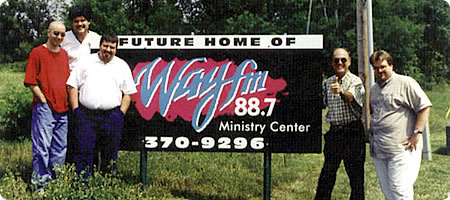
1999 – WayFM President Bob Augsburg (second from right) and local staff at the future location of the WayFM studios and offices in Nashville, TN
Getting Out Of The Boat.
One week later, the Augsburgs were invited to help a small radio station in Titusville, Florida do their first pledge drive. Interesting symbolism that they were driving to the Cape Canaveral “launch pad” area of Florida’s eastern shore not knowing the day would ultimately be the launch pad for their life’s largest enterprise. “Here we were in this tiny little red brick building on railroad tracks with the couple who started the station. They’d been on the air a couple years. He was an engineer who knew towers and transmitters, but not programming. I was a programmer who didn’t know engineering. I remember thinking, ‘If they can do it, why can’t we?’ I told them of the idea that wouldn’t leave us alone and explained that we didn’t know where to start — we didn’t know the first thing to do — and they said, ‘Start by seeing if there’s a frequency available.’ I left finally feeling that I did need to step out of the boat and see if God would open the door.”
“We were endeavoring to create the first top-40 Christian radio station in America.”
Bob and Felice took that first step, checking on local frequencies. Not only was there one available, it was the only unclaimed FM frequency in Fort Myers, it was one of the strongest signals in the area (50,000 watts), and there were only two months left to claim it. They were out of the boat.
They started researching the FCC website for available call-letters. Felice still has the printout. “We took the list to our Bible study and to some friends at church and simply asked what people liked.” It was their first mini “focus group.” The clear winner was WAYJ. Bob recounts, “I can’t believe we didn’t get it the first time we saw it. We wanted to create something that would show kids the way. Plus, “the way” was right there in Felice’s verse. ‘The way you should go.’ Plus there was the reference in John 14:6, “I am the WAY, the Truth and the Life.” Not to mention the Gospel-related-sound-bite possibilities this would create. ‘Join us on the WAY. Tune in to the WAY. Good news from The WAY.’ It was as if the call letters were saved just for us.”
Then the question shifted from ‘how do we do this’ to ‘how do we pay for this’? “Here we were, this non-profit organization with zero history and no industry model to follow. No model at all, successful or unsuccessful, in the entire country that would enable us to say, ‘it works in this city; here are the numbers.’ We were endeavoring to create the first top-40 Christian radio station in America. Not only that, we were in one of the oldest-population areas in all of Florida, where the median age is 47, and we’re attempting to launch what would technically be a youth-targeted station.Who in their right mind was going to give us a loan?”
At the time, the closest thing to an existing model was an all-volunteer station in Albuquerque, New Mexico but the Augsburgs were trying to create an airwave of a different color. “We didn’t want to take the suggested volunteer route. We had come so far already that we wanted to do this not just right, but the best we could,” asserts Bob. “Then if it failed, we would have no regret.
We wanted to make sure we had experienced DJs and professional media like jingles and advertising — basically put the best possible foot forward and be a cutting edge as the youth would expect. We had two interested on-air talents ready to relocate to Florida from other states and we had to tell them, ’Look, we only have about two weeks’ savings and there’s no guarantee that this won’t fold in a couple months.’ They didn’t care; they were ready to pick up and move, not to mention take somewhat of a pay cut.”
Call letters, a 50,000 watt signal, a small financial buffer to start — now all they need was a tower on which to hang it all. There was only one tower that would work and it was owned by a TV station, but the TV station wanted to move to a brand new tower. It seemed a flawless puzzle — enter the endangered wood storks and their rescuers that were bidding against the new tower.
As this unique twist unfolded, it served to illustrate to both the Augsburgs and the community at large, just how important their burgeoning station was. Bob muses, “There were teenagers in court actually crying tears of frustration about ’nothing to listen to.’ They had nothing in the area that was a Christian influence just for them. During all of this, I jokingly leaned over to the guy who owned the tower and said, ’if we win this thing, are you gonna give us five years’ free rent?’ He said sure. And we won. And he did.”
A few steps back, Bob had begun the resignation process at WSOR in order to remain honest about what he considered to be a possible conflict of interest.
Taking the initiative that might lead to sacrificing his job was a substantial leap of faith considering how much the Augsburgs were already struggling financially as a family and as a budding “small business.” But the station surprised Bob and Felice by allowing him to stay on board while granting him the freedom to continue pursuing and promoting his new venture — even as a possible competitor. It seemed everyone could see how much this broadcasting ministry was needed and wanted to do what they could to make it happen.
The measure of help balanced the measure of obstacles they had faced and were yet to face. Felice expains the unique challenges of radio saying, “Your average new business can get up and running in 90 days but radio is government regulated and waiting for some necessary green lights can take much longer. Sometimes years.” They would indeed wait a number of years to see some other WayFM stations hit the air. Huntsville, Alabama took 9 years to get approval, applying in 1994 and being approved in 2003. But Denver took the prize with a whopping 10 year wait for a government permit. Felice recalls, “We had to keep telling folks ’We’re doing the best we can and it’s out of our hands. There is nothing we can do to speed up the process.’ Sometimes we felt like our prayers were futile and there there was so much to learn in the way of patience — especially when the obstacle was sometimes a friend or colleague competing for the same frequency to start other Christian stations. You have to let go and trust God is accomplishing His purposes whether it involves you or not.” When WayFM finally turned on the mics and hit the airwaves the first time the symbolism in their choice of “first song” was not lost. They launched with Bryan Duncan’s “Help is On the Way.”
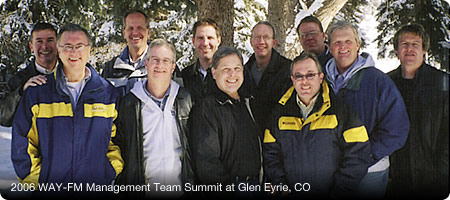
2006 WayFM Management Team Summit at Glen Eyrie, CO (left to right) Senior VP Dusty Rhodes; Huntsville, AL GM Thom Ewing; COO Lloyd Parker; Nashville Regional Manager Matt Austin; Wichita, KS GM Paul Anthony; Longview, WA GM Danny Houle; Tallahassee, FL GM Steve Young; Ft. Myers, FL GM Jeff Taylor; Denver, CO GM Zach Cochran; Florida Regional Manager Jim Marshall; CHRSN GM Faron Dice
The Community Responds:
“We Are So Glad You Are Here.” WayFM was the help itself, of course, but help was also on the way for them. The initial outpouring included an unexpected check for $1000 from a stranger which Bob says was “like a million dollars to us.” Numbers of supporters started showing up at the station just to say, “We are so so glad you are here.” At their first fund-raising banquet, they doubled their attendance goal of 300 but they were still flying blind, having no idea how they were going to pay for the evening and hoping they’d get at least enough pledges to cover the dinner bill. In the backroom of the Sheraton on the river in Fort Myers, pledges were tallied while the guest artist who’d performed that evening, a close friend of the Augsburgs, leaned over to Bob and asked, “Well, can we pay the bill or do we go to jail?”
They didn’t go to jail. They had raised $40,000 that night and they raised their own awareness that they were definitely not in this alone. Churches started a buzz putting announcements about The Way, 88.7 FM in bulletins and newsletters. Students would hold car washes. Youth pastors would encourage, “We’ll do anything we can do to help, because you’re changing our kids’ lives.”
Pastors weren’t the only ones sending that message. Letters and support were pouring in — even letters from little kids written in crayon. Almost as moving as witnessing this deluge was watching the rest of the world realize for the first time the significant need for this ministry. Bob recalls a “conservative friend” asking while visiting the station and listening to some of the “rockier” selections, “How could this music be having any impact on people?” Bob silently retrieved a folder stuffed with handwritten notes from teens, scrawled crayon prayers, and letters from parents, “and plopped it on his lap without saying a word. He only had to read a few snippets. ’I accepted Christ at one of your concerts.’ ’I was thinking of taking my life and I heard a song by Russ Taff that made me hope.’ Crying, he acknowledged, “Yes, this music can be used by God in a powerful way.”
“Local impact makes it worthwhile in every city that we’re in.”
From Fort Myers, WayFM branched to Nashville, almost ten years to the day from when Felice came home with the verse that said, “I will lead you in the way. . . .” When a third station went up in West Palm Beach, it became a flagship for sponsoring major outdoor concerts and music festivals where attendance grew from 2,000 to over 10,000 in just a few years. Nashville picked up the cue and by WayFM’s 10th anniversary, Music City had set an all time event attendance record of 16,000+.
Provision continued to abound at every turn as WayFM outgrew itself time and time again. In Palm Beach, a WayFM donor in his 70s (not the target audience) built a state of the art non-profit center to offer rent-free space to four of his favorite charities. WayFM was one of the blessed four. With land holdings expanding in both Florida and Tennessee, and impact snowballing beyond he Augsburgs’ humble imagination, the Board of Directors decided that it was time for Bob to move out of the day to day operations of local stations and begin to focus more on starting new stations to expand their reach. A home office was established in Colorado Springs in 2001 and the ministry’s reach has indeed expanded, today totaling fourteen full power stations which when combined with low power FM repeaters and affiliates who receive programming from the satellite network, reach more than 100 communities with music that changes lives.
Live, Local and Going Global.
It’s more than the music that changes lives. Being “live and local” affords WayFM a unique ability to meet the needs of various ministries in the communities they serve. From toy drives to relief efforts to raising awareness of other needs, Bob says, “Local impact makes it worthwhile in every city that we’re in. It’s one thing to know that we’ve grown to over 100 FM signals. It’s another thing to put up a map from one coast to the other and see little circles all over the place marking cities that are hearing WayFM, and thinking back on how very little faith we had that even one station could happen. God has taken that seed and has grown it.”
WayFM’s impact is no longer just national. They were one of the first stations to begin streaming audio in the late 1990s. Now, between internet streaming through their partnership with Compassion International they’ve expanded their influence globally. They’re still getting the same letters of thanks and support, but crayon notes have grown into emails from oppressed nations where preaching the Good News is forbidden. One particular listener emailed from Pakistan to say he was listening to WayFM online and being tremendously blessed, but because of how dangerous that was, he added, “Please, do not respond to this email.”
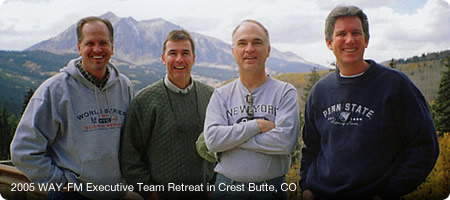
2005 Executive Team Retreat in Crested Butte, CO (left to right) COO Lloyd Parker; Senior VP Dusty Rhodes; President/Founder Bob Augsburg; CFO Dar Ringling
The WayFM Vision Today.
A letter like that illustrates how far the ministry has come since the “Why can’t we start a station of our own?” from twenty years prior — and how much God can do even when our first reaction is, “That’s impossible.” As Bob begins to travel in celebration of WayFM’s 20th Anniversary, he looks forward to revisiting “the places where major changes began — like the spot where we stood in 1987 offering a dedication prayer for Fort Myers, or Nashville where, in 1992, after moving there to launch the second station, I prayed, ‘Lord if you want to grow this ministry I invite you to come in and grow this WayFM vision any way you choose. We’ll just try to follow You and keep up with You.’”
The current “way” is a four year vision called Vision 20:1, the goal of which is “…to expand our outreach to 20 million people by 2007, resulting in a daily, Christ-centered impact in the lives of 1 million youth and young adults.” This is the modern day impact of a project that started its first day on the air by saying, “We’re not sure how long this will last, but we’re glad to be here for you today.” Looking back Bob adds, “then we just started playing the music” and it hasn’t stopped.
Used by Permission. This article was featured in the April/May/June 2007 edition of Wireless Age magazine
